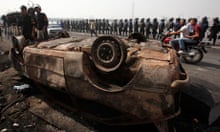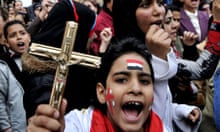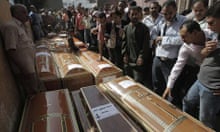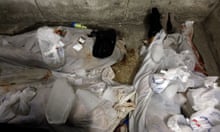Egypt's military rulers have held emergency talks with Christian leaders after the worst violence since February's revolution left 26 people dead and 300 injured – and raised grave doubts about the country's democratic transition.
The Coptic church called on followers to fast and pray for three days from Tuesday to mourn Christians killed in clashes with Muslims and security forces on Sunday night, now the subject of an investigation ordered by the ruling Supreme Council of the Armed Forces (Scaf), led by Field Marshal Mohammed Hussein Tantawi.
Issam Sharaf, the interim prime minister, warned of a "despicable conspiracy" against Egypt and called for unity.
Egypt's Copts, numbering between 10 million and 15 million, are the largest Christian minority in the Arab world. Hundreds of mourners gathered at the Coptic cathedral in the Cairo neighbourhood of Abbassia, chanting slogans against the military. "Tantawi you traitor, the blood of Copts is not cheap," shouted one. Christians threw stones at police outside the hospital where many of the casualties of Sunday's violence were taken, while scores of distressed Coptic women dressed in black and carrying wooden crosses wept over the death of their "martyrs".
Video clips of the incident showed military vehicles ploughing through crowds of demonstrators so that several were crushed to death. It was the worst violence since Hosni Mubarak, who ruled Egypt for 30 years, was ousted on 11 February. The Copts insist they were marching peacefully when thugs attacked them, drawing in the military police who used what activists described as unnecessary force.
The backlash was sharp and swift. Ayman Adli, a 33-year-old carpenter, blamed Scaf for doing nothing in the face of a "growing wave of Islamism". There was "no real political will to solve Copts' problems of oppression and lack of rights and the army wanted to teach Coptic protesters a lesson by killing some to abort future demonstrations", he claimed.
"If Scaf can't protect us, it's obvious that they won't give us our rights," said law student Marko Habib. "Now it's time for them to cede power to a civilian who truly believes in citizenship and equality and has the will to protect minorities."
Concerns about the way the protests were handled were fuelled when state TV announced on Monday that there had been no deaths among the military after a newsreader reported at least three – and called on "honest Egyptians" to take to the streets to protect the armed forces.
"I feel like I'm in a nightmare and can't wake up," said Emilia Salem, 25. "How have Copts become so unprotected in their own country? Why is it so easy to kill over a dozen of us in a protest while those who stormed into the Israeli embassy were not even harmed?"
Al-Azhar University, Egypt's highest Muslim religious institution, called for a new law regulating the construction of churches. The incident in Aswan that sparked Sunday's protest was an attack on a church that attackers claimed was being built illegally. Coptic groups have long complained that laws regulating houses of worship are discriminatory.
With tensions running high, security was stepped up in central Cairo, with additional troops deployed outside parliament and the cabinet building.
Some have speculated that the violence may mean Scaf will postpone the parliamentary elections, due on 28 November.
Internationally, there was palpable alarm about the violence, widely seen as a serious setback to prospects for peaceful change in the most populous country in the Arab world and a beacon to others where pro-democracy protests are continuing.
In Washington the White House called for restraint and respect for the rights of minorities. "These tragic events should not stand in the way of timely elections and a continued transition to democracy that is peaceful, just and inclusive," it warned in a statement.
William Hague, the foreign secretary, said: "It is essential that all sides take immediate steps to de-escalate the situation and engage in dialogue. The freedom of religious belief is a universal human right which needs to be protected everywhere, and the ability to worship in peace is a vital component of any free and democratic society."
Germany's foreign minister, Guido Westerwelle, said: "It is about time that the Egyptian leadership understands the importance of religious plurality and tolerance."
IHS, a London-based consultancy, said: "The rapidity with which this protest escalated to violence and the deaths of so many people highlights the febrile atmosphere currently pervading Egyptian politics, where minor disputes have the ability to turn into full-scale anti-government and anti-military protests.
"Given the collapse of the military's prestige in the public imagination since February over its perceived intransigent approach to the transition back to civilian rule and the launch of judicial proceedings against former Mubarak-era officials, this latest incident will make it even harder for the military to regain the trust of the wider population."



